A Test With No Answer
No procedure exists that can prove virginity, yet dangerously unscientific virginity tests occur regularly—even in the United States. Marie Claire, in partnership with the Fuller Project, investigates the controversial exams and the gray area surrounding them that endangers both patients and medical professionals.

This story was reported with the Fuller Project, a journalism nonprofit reporting on global issues impacting women.

Twenty-two-year-old anatomist Andreas Vesalius stood over the limp body of an 18-year-old Belgian noblewoman. A tight corset constricted her torso; she died from an ailment of the lungs, it seemed. But Vesalius, fresh out of medical school in Paris, wasn’t interested in what killed her. He wanted to study something far more controversial: her hymen.
It was the year 1536, and the hymen—a membranous tissue found near the entrance of the vagina—had never been detailed in medical texts. Instead, it was steeped in legend. The notion of purity and chastity determined whether or not women were eligible for marriage and if they even deserved to live.
Not all virgins have hymens, Vesalius later wrote in a groundbreaking book about human anatomy (which included one of the first relatively correct anatomical descriptions of the hymen). But Vesalius would get something crucial wrong: A so-called “intact” hymen, he wrote, was “proof of praiseworthy virginity.”
Nearly 500 years later, this myth remains pervasive around the world. The obsession with women’s virginity isn’t found only in places like Iraq, Indonesia, South Africa, and Afghanistan (a country where premarital sex is a criminal offense). Across the United States, too, emergency-room physicians, gynecologists, sexual-assault nurses, and family doctors report being asked to perform, or performing, “virginity tests”—sham exams in which two fingers or a speculum are inserted into the vagina in search of the hymen or to measure the elasticity of the vaginal walls, neither of which can demonstrate whether or not someone has had intercourse.
“So-called virginity testing is nothing more than an assault on young women with no scientific or medical basis,” says Jonah Bruno, director of communications at the New York State Department of Health. And yet, girls and women are suffering from the fears and consequences of “failing” a virginity test and grappling with the aftermath of being forced to undergo such an invasive exam.
It’s “rape by instrument,” says B, a now-31-year-old woman who asked to be identified by her first initial only because of the blowback she might get from her family. Twenty years after what she calls an “extraordinarily traumatic” forced hymen exam, B is still working with a therapist to cope with the ordeal that drastically changed how she saw herself, her body, and her sexuality.
Stay In The Know
Get exclusive access to fashion and beauty trends, hot-off-the-press celebrity news, and more.

During her exam in 1999, B’s own mother held her down on an exam table at a North Carolina clinic. The doctor inserted a long cotton swab into her vagina, searching for a sign that would convince her mom that she was a virgin. B had a urinary-tract infection, and her mom was sure it was because she was sexually active. The then shy, studious fifth grader had never kissed a boy, but that didn’t matter: Her mom would believe her only if a doctor checked her hymen. After a few minutes, the doctor declared, “Congrats, Mom, she’s still a virgin,” and B breathed a sigh of relief; she had been terrified her hymen had already “broken” during cheerleading practice. Looking back, B says the doctor could have just as easily said she was not a virgin, potentially submitting her to the wrath of her abusive alcoholic mother.
A year after the exam, when B was 12, a stranger molested her outside of a park. She never told her mother, fearing she would see her differently. When she was 14, a boy raped her at a party. Again, she didn’t tell her mom, worrying “she wouldn’t love me if I wasn’t a virgin.” B ties her trauma back to the messaging she received as she lay on the exam table shaking in fear. “I felt like I was, at that point, damaged—like no one would care,” B says. “If I wasn’t a virgin or pure in some way, I was damaged or unwanted.”
For Elena*, a 21-year-old woman whose mom forced her to undergo a so-called virginity test in Kentucky in 2012, the experience destroyed their relationship and left her traumatized. “I’m not raising a whore!” her mom screamed in the car on the way home from school after discovering Elena’s friend had sent naked photos of herself to a boy on Facebook. A gynecologist checked Elena’s hymen and handed a piece of paper to her mom saying she was, in fact, a virgin. “I never told her a private thing again,” Elena says.
On anonymous online platforms like Reddit, where both B and Elena first turned seeking support, women in the United States and abroad share their own painful, abusive, and arguably illegal experiences with virginity testing—mothers instructing doctors to test their daughters, without consent. They talk of “being so terrified and ashamed,” of being held down by a parent while a male gynecologist “violated” them.
Women are suffering for no reason. No medical procedure exists that can accurately determine if a woman—or a man, for that matter—is a virgin. The hymen often tears or wears away as women age and during everyday activities like running, just as it can stretch during sex.
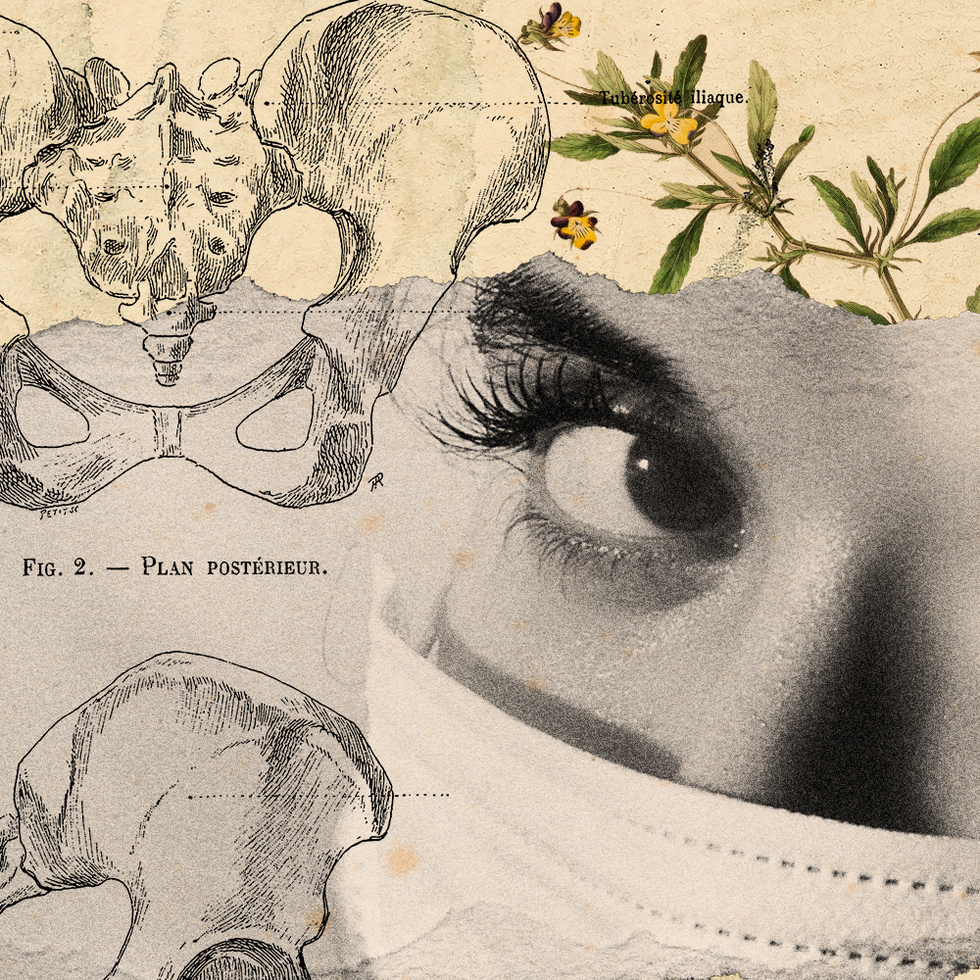
One year ago this month, the World Health Organization called on governments worldwide to ban virginity testing, arguing that the procedure “violates several human rights and ethical standards, including the fundamental principle in medicine to do no harm.” While the international fight to end virginity testing is well-documented and ongoing, there has been almost no action or public acknowledgment by the medical community or by legislators that girls and women are being coerced and forced into undergoing virginity testing in the United States. It’s largely been kept a secret—until now.
In the first investigation of its kind, based on dozens of interviews with women, medical professionals, and health researchers across the country, Marie Claire and the Fuller Project have found that not only is virginity testing being requested in the United States with frequency by both religious and secular communities and occurring here, but the practice remains wholly unregulated. There are no federal or state laws banning virginity testing, nor are there clear medical guidelines or standards of care from the country’s top medical associations, like the American College of Obstetricians and Gynecologists (ACOG) or the American Medical Association, to help physicians and nurses navigate the ethical and legal minefield that is virginity testing.
In 2016, a group of physicians from Houston’s Baylor College of Medicine and New York City’s Cornell University and New York Presbyterian Hospital, as well as ACOG, invited hundreds of OB-GYNs to participate in a survey on the topic. Of the 288 physicians who responded, 10 percent said they had at least one patient who had requested virginity testing, and, of those, 34 percent said they, indeed, performed the procedure themselves.
“Virginity testing is definitely happening in the United States,” says Ranit Mishori, M.D., a professor of family medicine at Georgetown University School of Medicine who is researching the practice and the lack of guidance around the issue. The invasive exams are “happening under the radar,” Dr. Mishori says. Medical professionals who perform virginity tests rarely admit to doing so, and women almost never come forward or discuss their experience outside of families. It’s “very hard to get numbers of how many cases [there are],” she says.
B says she’s never met another woman who admitted to going through what she endured as a teenager. “It’s not something people talk about,” says B. “[People] think it only happens in the Middle East with child brides. But it happened to me.”
The elusive hymen, named after the Greek god of marriage, was misunderstood and fetishized even before the days of Vesalius. Long before paternity tests were invented, enforced premarital virginity was a way to control women and to ensure men were the biological fathers of their children.
In the Old Testament, it’s written that a new bride should be stoned to death outside of her father’s house if her husband claims she was not a virgin on their wedding night and if “no proof of the young woman’s virginity can be found.” In the Middle Ages, it was thought that a drinking vessel often made from the horn of a cow could detect if a woman was chaste. (Only a true virgin could drink out of the horn without spilling, of course.) It was even rumored that Queen Elizabeth’s gynecologist performed a virginity test on Lady Diana Spencer before her marriage to Prince Charles (though this was never confirmed). Then-20-year-old Diana was a “bona fide virgin,” her uncle, Lord Fermoy, said of his niece in a public statement to quell an obsession with her sex life.
In the United States, virginity continues to have a major impact on education, societal norms, even government policy: In 2017, one third of federal funding for teen sexual education went to abstinence-based programs, even though studies show such education doesn’t necessarily prevent sexual activity. Language about virginity reinforces the myth that a woman’s body is something she should give, traditionally to a man, and that it’s a one-time thing: She lost her virginity; she gave it up to him; he popped her cherry; she was deflowered.
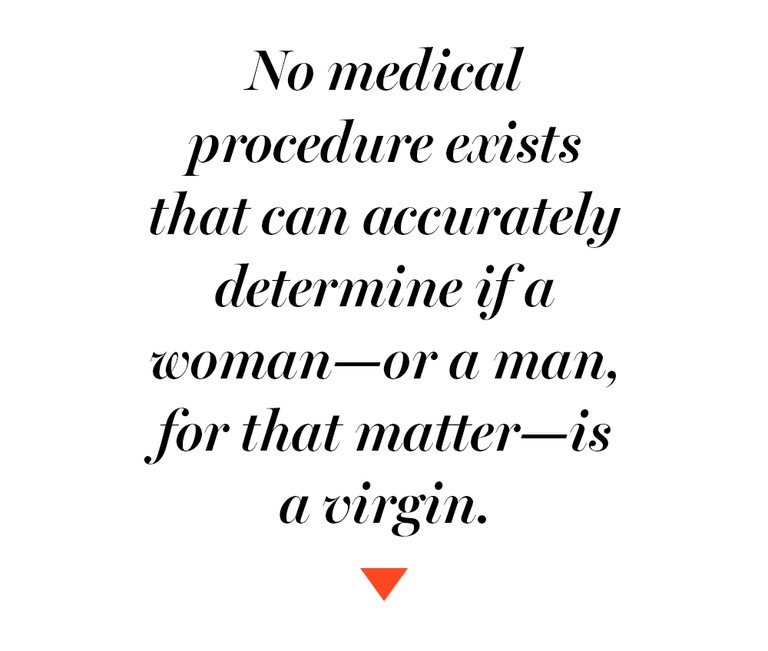
Yet, virginity is not a medical term—its description cannot be found in Gray’s Anatomy—it’s a social construct that varies widely in meaning across communities, religions, and cultures. Scientists aren’t even exactly sure what biological role the hymen plays. (Some suggest it developed to protect babies and young girls from bacteria.) Hymens, like many body parts, vary widely in shape and size. Most can be found near the entrance of the vagina, forming a crescent or doughnut shape around the opening. Some women have a septate hymen, in which there’s an extra bit of membrane that creates two openings; a microperforate hymen, a membrane that nearly covers the entrance to the vagina entirely; or a cribriform hymen, one with many little holes. Very rarely, a woman may have a hymen that completely covers the entrance of the vagina, called an imperforate hymen. These types of hymens can make it difficult to menstruate or have sex and might require minor surgery. At times, girls are born without a hymen; others are born with hymens so thick, they remain intact even after having sex.
Despite science saying otherwise, the myth that a hymen will be broken upon the first instance of sexual intercourse persists, leaving medical professionals to grapple with it and respond at their own discretion. “The question is, what do you do when a patient comes into your exam room and asks for [a virginity test]? For the sake of this conversation, an adult [woman]?” posits Dr. Mishori. Perhaps the woman requests such an exam in order to get married. “What do you do? How do you navigate this gray zone?”
Deborah Ottenheimer, M.D., an OB-GYN and director of the Women’s Holistic Initiative at Harlem United Community Health Center in New York City, says she has been asked many times to perform virginity exams on adolescent girls, tests requested by mothers, grandmothers, or by women themselves. Virginity checks are common prior to arranged marriages, Dr. Ottenheimer says, but also when families want to know if a girl or woman has become sexually active. “Virginity is proof of honor [in some cultures],” she adds. “A woman’s or girl’s body isn’t really her own. [It’s] all linked up with other kinds of human-rights abuses against women. If you devalue a woman’s body to that degree, you’re most likely [going] to abuse it in other ways too.”
Whether or not women request it themselves or consent is beside the point, say ethicists. Virginity testing is “incompatible with professional obstetric and gynecological ethics,” wrote Laurence B. McCullough, Ph.D., adjunct professor of ethics in obstetrics and gynecology at Weill Cornell Medical College in New York City, in a 2015 article he coauthored in The Lancet. Medical professionals have the “responsibility to lead efforts to enact legislation that prohibits virginity testing,” it read.
Medical professionals told Marie Claire that they have lied about hymen exam results, claiming women and girls are virgins to protect them from possible harm—the assumption being that if they refuse to perform the exam, someone else could come up with a potentially dangerous result. “She could be beaten,” says a New York–based pediatric nurse practitioner specializing in adolescent reproductive health who asked to remain anonymous. During her career, in which she largely served a Dominican community, she says she received requests from parents to perform virginity tests about once a month. She would send the parents out of the exam room, have a private conversation with the girl, and then tell the parent she was a virgin if the girl asked her to.

Mahsa Hosseini, M.D., an OB-GYN in Brooklyn who treats women from Middle Eastern and Muslim communities, says women in their 20s and 30s ask her for virginity tests for two reasons: because they’re concerned that their hymen might have ripped or worn away and that they won’t bleed on their wedding night (which is expected of women in some cultures) or because they need a signed doctor’s note (for a reason Dr. Hosseini’s “not really sure” of) stating they are virgins. While Dr. Hosseini agrees that there are many types of hymens, she also agrees to carry out virginity tests and write a letter stating the woman is a virgin. (Via email, Dr. Hosseini later clarified that she typically “[doesn’t] tell the patient ‘you are a virgin’ or ‘you are not a virgin.’ The answer is a description of how the hymen looks.”) She says that despite some ethicists’ opinions, “we live in a multicultural society...and it’s important to understand the different cultures and their needs. It doesn’t mean I agree with all of those beliefs.” Dr. Hosseini also says that, “with the exam, you can see if there’s been penetration.”
In contrast, WHO maintains that such exams are scientifically invalid and unnecessary and that such misunderstandings about female anatomy can lead to great harm.
Fraidy Reiss was a 19-year-old bride-to-be in 1994 when her ultra-Orthodox rabbi instructed her to get a virginity test in secret before her wedding night. It was a wintry December day when Reiss put her feet in the stirrups at a Brooklyn gynecologist’s office. “I remember feeling terrified,” she says; it was the first time anyone had seen her naked. The doctor “confirmed” she was a virgin based on the presence of her hymen. But what if the result had been different? “It would have meant life as a pariah,” says Reiss, who has since divorced her husband and left her ultra-Orthodox community and is now an activist against forced marriages through her non-profit, Unchained at Last. “My physical safety would have been threatened” if the gynecologist hadn’t said she was a virgin, she says.
In the United States, researchers estimate between 23 and 27 women are murdered in honor killings each year, according to a 2015 U.S. Department of Justice report. Sexual activity deemed immoral or unacceptable by family members is often the prompt for “honor” killings, but it’s difficult to quantify because “information about honor violence is held tightly within families” and “victims or potential victims may not report victimization.”
When doctors legitimize virginity by conducting fake tests for it, they arguably uphold one of the oldest lies used to control women: that whether or not a woman has had sexual intercourse determines worth. In 2005, in Birmingham, Alabama, a 12-year-old named Jasmine was killed by her mother after she told her she was no longer a virgin. “She straddled her daughter and poured bleach down her mouth, thinking it would cleanse her,” Birmingham police officer Warren Cotton told Marie Claire. He responded to the mother’s 911 call to their home, where he found Jasmine lying lifeless on her bedroom floor.
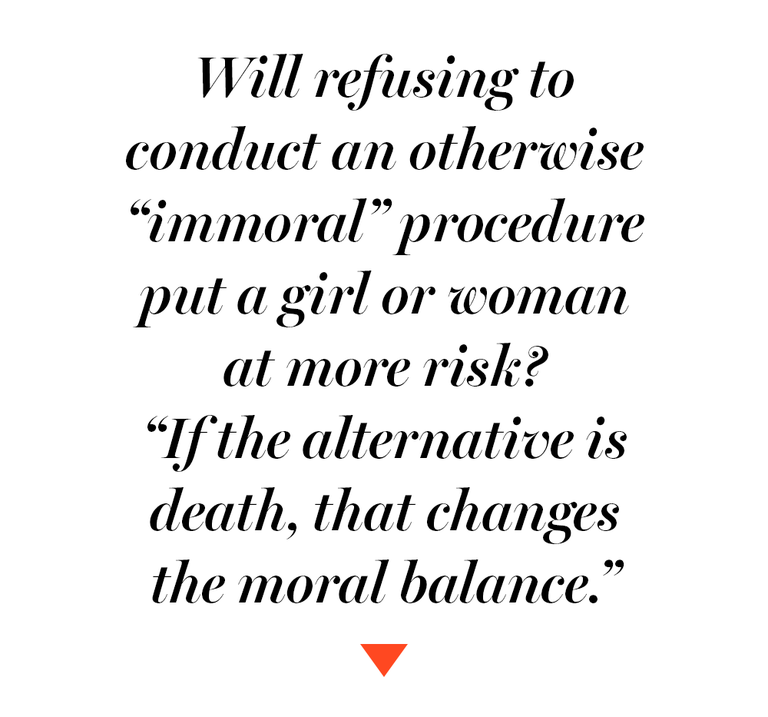
In 2012, 19-year-old Aiya Altameemi of Arizona was beaten, threatened with a knife, and restrained in her bed by relatives after she spoke to a boy outside of her school. Altameemi told a school counselor that her family members, who were later sentenced to two years’ probation, were “trying to protect her” because they wanted her to “be a virgin for an arranged marriage,” Reuters reported.
In a few instances, adults have been charged for carrying out at-home virginity tests. In one 2015 case, an Indiana court charged Brent Kraay with felony child molestation after he admitted to manually checking his daughter’s hymen to “see if she was still a virgin,” among other sexual acts that he claimed he was utilizing in hopes of “educating” his daughters about sex.
The hymen myth is also at the heart of a multimillion dollar cosmetic-surgery industry. Often, women get cosmetic hymen surgery out of pressure to bleed on their wedding night (even though plastic surgeons stress there’s no way to ensure that). Other women say they desire to be “re-virginized” for a sexual partner. During the procedure, known as a hymenoplasty, the hymen is “re-created” by sewing together what remains of the membrane or a new hymen is created from the lining of the vagina. The procedure can cost thousands of dollars and, per ACOG, isn't medically indicated.
Jeffrey S. Palmer, M.D., director of genital reconstruction with Northwell Health in New York, who performs hymenoplasties—sometimes called “virgin stitches” by other physicians, says he’s seen an increase in requests for the procedure (something he attributes in part to women “taking control of their sexuality”). Women from all over the world (“There’s not a country I haven’t seen,” he says) and American-born women of diverse backgrounds (“Muslims, Orthodox Jewish, Catholic,” he lists) ask him to create or reconstruct their hymens, giving a variety of reasons. Some women are entering second marriages and want to be “re-virginized” for their own sexual or personal satisfaction, Dr. Palmer says, or as a gift to their husband. Others are expected to be virgins on their wedding night and might have to pass a virginity exam or bedsheet test. He confirms he has performed the procedure on girls under 18 with parental consent. (By law, there is no minimum age requirement for most cosmetic surgeries; parental consent is required for patients under 18.) Mothers may bring in teenage girls to get their hymen cosmetically altered in “preparation for marriage,” sometimes to a “chosen husband,” he says. Dr. Palmer says his office is a “safe space” for girls and women and that why they’re considering a hymenoplasty is “their privacy.” Regarding ACOG’s position that the procedure is not medically indicated, Dr. Palmer counters that “cosmetic surgery, regardless of anatomical location, can have potential value that is different for each individual...[and] profound benefits, including psychological.”
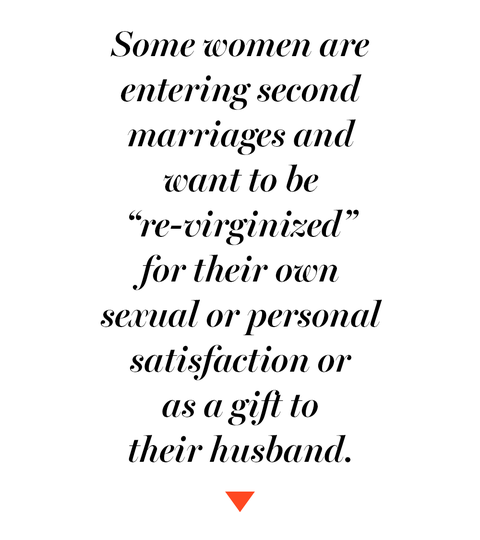
Sara, a 23-year-old woman from the United Arab Emirates, sought out a hymenoplasty in Texas before her wedding. The procedure was entirely her decision and “100 percent” worth it, she says, because it gave her “self-confidence” that she would bleed on her wedding night in case her husband’s family asked. But, she says, she won’t “allow her daughter to live in such a strict culture that respects [a woman]…only if she is still a virgin.” Culture, she says, is driving such beliefs, not religion: “Religion protects people, doesn’t make them suffer.”
Another 23-year-old, Maryland Christian minister Brelyn Bowman, wrote on social media that she made the decision to get a virginity test before her 2015 marriage as a gift to her father, Pastor Dr. Mike Freeman. She surprised him with a doctor-signed “certificate of purity” in front of hundreds of guests at her wedding reception. Bowman faced both praise and criticism on Instagram when she posted a photo dancing with her father along with a caption explaining how the certificate proved that her “hymen was still intact,” representative of the “covenant he gave me when I was 13” to remain a virgin until marriage. Her sister also presented a virginity certificate at her own wedding, Bowman wrote in her 2016 book, No Ring No Ting. (Bowman’s assistant said the minister was “unable to accept” an interview request “at this time due to other projects.”)
Advocates worry virginity tests and hymenoplasties could be further endangering girls, possibly concealing rape or forced marriage or trafficking. There’s “high value in getting a girl who will lose her virginity in sex trafficking,” says Shelby Quast, Americas director of Equality Now, an organization that campaigns for legal reform of issues impacting and discriminating against women and girls. “People will pay for that.” But, she says, “when [doctors] feel it’s a religious practice, they won’t say anything.”
The hymen myth itself can impede efforts to identify and respond to sexual abuse. “Say a parent takes a child for an exam and the exam is normal. Even though a child is saying [abuse] is happening, the parent then says they must be lying or don’t understand because the hymen has no tears,” says Gail Hornor, a pediatric nurse practitioner working in child maltreatment at Nationwide Children’s Hospital in Columbus, Ohio. “The parent might be less likely to protect a child.”
Decisions of guilt and innocence after sexual violence have been hung on the state of a potential victim’s hymen. Misunderstandings about the hymen have “negative effects on a jury’s understanding,” says Hornor, who frequently serves as an expert witness in an effort to educate juries about what a hymen is and, perhaps more important, what it is not. In the event of sexual violence, a girl’s or woman’s hymen or vagina might show signs of distress, like acute bruising or lacerations. But experts say that most of the time, survivors of sexual abuse and rape have normal vaginal exams. The vagina can heal quickly, sometimes within days, making it incredibly difficult to physically prove sexual violence occurred.
And yet, the size, thickness, and presence of the hymen—information often collected in sexual-assault medical forensic exams, a.k.a. rape kits—are being used against girls and women. In 2009, a West Virginia court ordered a 15-year-old girl to undergo a gynecological exam to determine if her hymen had been “disturbed” after she accused her brother of years of sexual abuse. In one 2004 Ohio rape case involving a 13-year-old girl, the defense argued that “because the victim’s hymen was intact, she was a virgin and, therefore, could not have been raped”—exactly the kind of statement expert witnesses like Horner work to disprove as medically inaccurate.

In Wetumpka, Alabama, this September, defense attorney Desirae Lewis, representing two men accused of rape, made headlines when she asked a court to force the alleged victims to undergo vaginal exams. The defense attorney argued that she needed the results of the sexual-assault exams since the “state had no physical evidence.” The court refused the request. “Having a hymen torn does not show you were raped or sexually abused. It doesn’t show you were not raped or sexually abused,” assistant district attorney Mandy Johnson said.
But Lewis’s scheme is not uncommon. It’s “just another example of people trying these strategies to discredit victims,” says Jennifer Long, a lawyer and CEO of AEquitas, a nonprofit working to refine and strengthen prosecution practices to help survivors of gender-based violence. “If you have an exam and there’s no penetration noted, I can almost guarantee a defense will try and use it against a victim.”
“I’ve testified a lot,” says Julie Groat, a registered sexual-assault nurse who has worked in the Detroit area. “I’m asked by judges: Is she or is she not a virgin?” Groat responds: “I cannot tell you what you’re asking me.”
Parents or family members of young girls have even gone so far as to request Groat administer a rape kit to essentially serve as a virginity test. The frequency of such requests was alarming enough for her team at the Wayne County SAFE Program, a nonprofit assisting sexual-assault survivors, to meet with the Michigan attorney general’s office to fine-tune its policies and procedures, like requiring a police report be filed when requesting a sexual-assault exam. “[Determining virginity is] not the purpose of a medical forensics exam,” she says.
The question of how to better protect girls and women is difficult to answer. Outside of the United States, women’s-rights organizations and activists have successfully helped pass legislation and put pressure on governments and communities to curb the practice of virginity testing and stop the dangerous spread of misinformation about the female anatomy.
In 2011, following an outcry from human-rights defenders, a Cairo court ruled virginity testing on protesters illegal after the military detained, strip searched, beat, and performed virginity tests on women during the 2011 Egyptian revolution. In 2013, India’s Supreme Court ruled such exams, used in court cases to determine whether or not sexual violence occurred, violated the right to privacy. The following year, the Indian government maintained that hymen exams have “no bearing on a case of sexual violence,” Reuters reported, though the law is not being adequately enforced. In 2016, in northern Iraq, Human Rights Watch and local advocates say they successfully lobbied a judge to halt hymen testing of girls and women who escaped Islamic State enslavement. To have their hymens examined by Iraqi doctors, even in an effort to bring ISIS to justice for sexual crimes, was “abusive and inaccurate,” said HRW. In 2018, Bangladesh’s High Court banned the use of virginity tests, once required to “prove” rape occurred. This year, an Afghan penal code criminalizing forced virginity testing, except when ordered by a court or when a woman consents, was amended to clarify that the tests are legal only when ordered by a court. (Afghan women claimed that their consent was often forged or forced.) The country’s leading human-rights organization has called on the Afghan government to ban the exams unconditionally.
Meanwhile, in the United States, there are no state or federal laws banning or regulating virginity testing or hymenoplasties outside of requiring patient or parent consent, which health advocates say can be coerced.
The American Medical Association does not offer guidance for medical professionals on the issue of virginity testing. Nor does the American Urological Association, the American Society of Plastic Surgeons, American Medical Women’s Association, the American College of Physicians, the American Academy of Pediatrics, or the American Academy of Family Physicians.
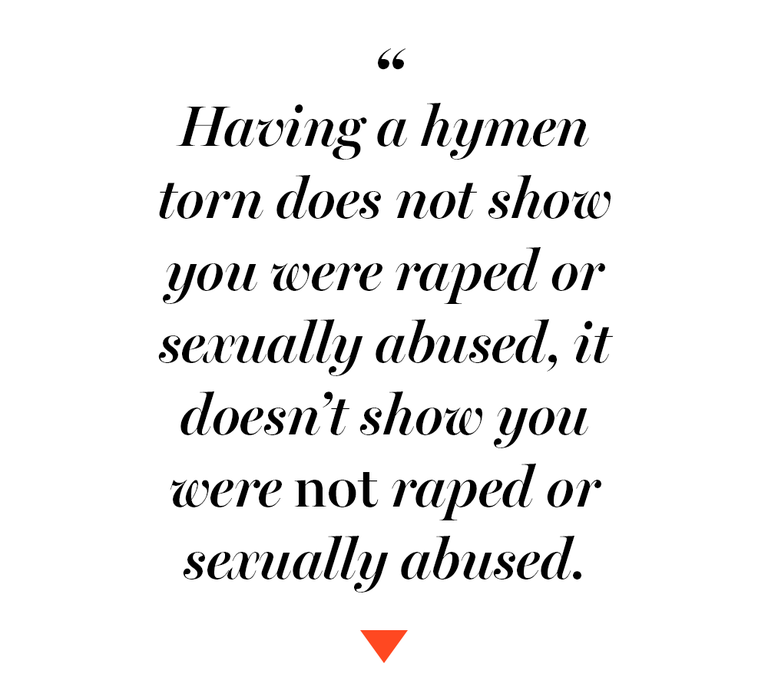
ACOG urges caution for physicians who face requests for “re-virgination” procedures, or other cosmetic vaginal procedures, and raises concerns around the “ethical issues associated with the marketing of these procedures and the national franchising in this field.” But the organization stops short of urging physicians to deny such procedures. And it has not issued clinical guidance or standards of care around the issue of virginity testing.
“The bottom line is that there’s no such thing as a ‘virginity exam,’” says Maura Quinlan, M.D., an associate professor of obstetrics and gynecology at Northwestern University and legislative chair for the Illinois section of ACOG, by email. “So ACOG won’t have a position paper. It’s a myth that you can tell [in an] exam if a woman is a virgin.”
Virginity testing “would be a hard thing to regulate,” says Dr. Ottenheimer. “You need education, community education, medical societies writing a standard of care. It can’t just be the law.” And practices like hymenoplasties and virginity tests are not “black and white,” she adds. Will refusing to conduct an otherwise “immoral” procedure, as she calls it, put a girl or woman at more risk? “If the alternative is death,” Dr. Ottenheimer says, “that changes the moral balance.” Mandatory reporting by physicians of honor-related practices might improve awareness but could also lead to women avoiding medical care or the weakening of doctor-patient relationships.
Now’s the time for action through education, says Kim Day, a director at the International Association of Forensic Nurses. Day has treated girls and women like B, who might have sought out help following her molestation and rape if she hadn’t worried about her mother’s reaction. “They think they’re not clean—that they’re no good anymore,” Day says of survivors of sexual violence who often worry if their hymens are still intact. She sits them down and explains her theory: “Virginity is something you give away willingly,” she says matter-of-factly. It’s not about the vagina—“it’s a heart thing.” That’s something that needs to be taught urgently, Day says: “It starts with education. It starts in the home.”
But until parents, educators, law enforcement, and medical professionals are better informed and protections are put in place, girls and women will continue to be judged and deemed worthy—of love, even of life—based on the appearance of a thin piece of membrane. One that never meant much of anything at all.
Marie Claire and the Fuller Project are committed to reporting on this issue. If you have been forced or coerced into undergoing a hymen exam, or submitted to such an exam willingly, and would like to share your story anonymously or otherwise, reach out to reporter Sophia Jones at sophia@fullerproject.org.
Additional research by Fuller Project’s Corinne Redfern in the Philippines, Khwaga Ghani in Afghanistan, Anita Reza Zein in Indonesia, and Ilayda Lynch in the U.S.
*The names of some women have been changed or withheld at their request.


Sophia Jones is a senior editor and journalist with the Fuller Project, a journalism nonprofit reporting on global issues impacting women. To learn more about their work visit fullerproject.org.
-
 Miley Cyrus Is in Her Normal-Girl Fashion Era
Miley Cyrus Is in Her Normal-Girl Fashion EraNothing could have prepared me for her new look.
By Kelsey Stiegman
-
 The Trendy Retro Sneakers I’m Wearing on Repeat
The Trendy Retro Sneakers I’m Wearing on RepeatFootwear designers are on a vintage kick, and I'm all for it.
By Emma Childs
-
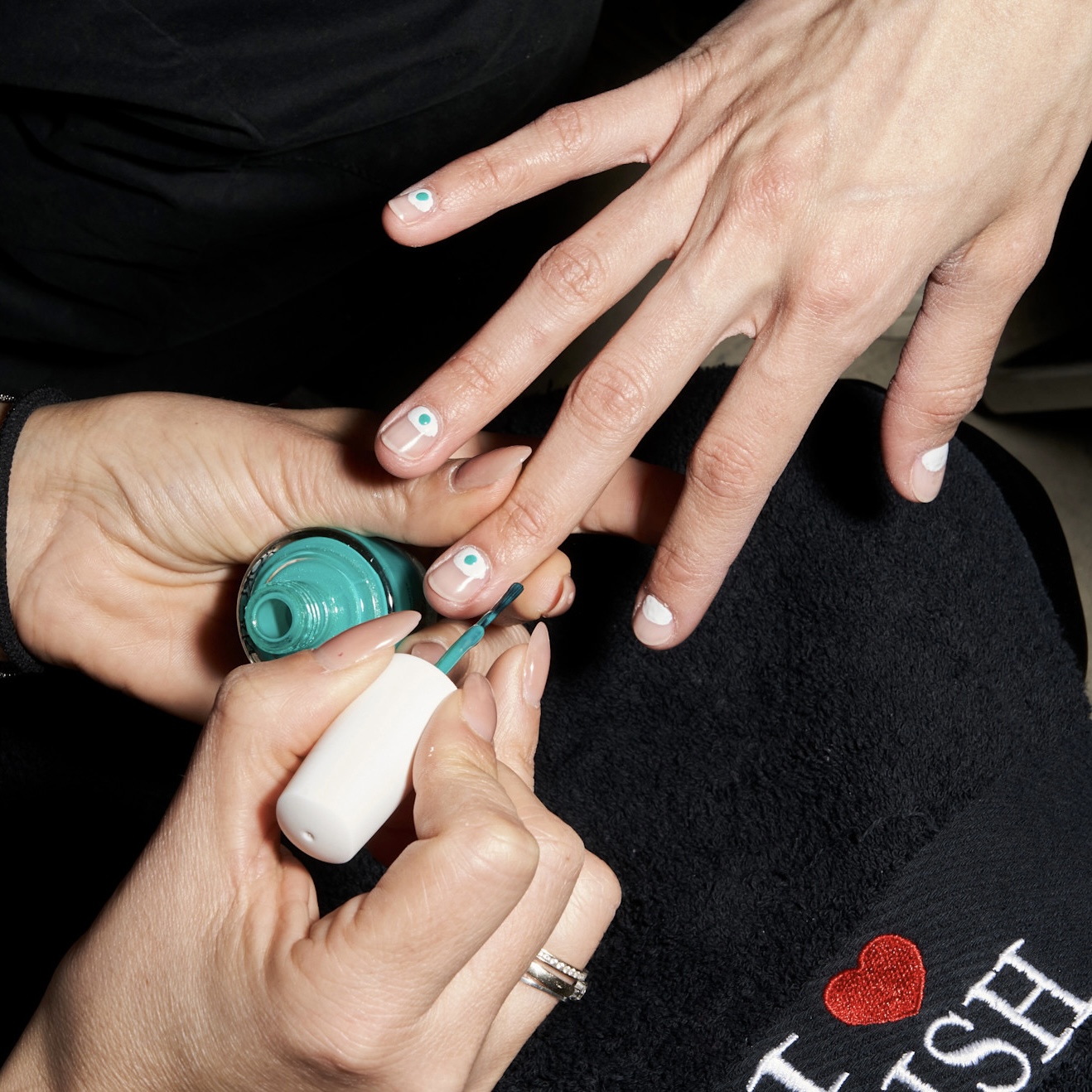 As a Chronic Nail Biter, I Swear by These Chic Mani Designs to Look Pulled-Together
As a Chronic Nail Biter, I Swear by These Chic Mani Designs to Look Pulled-Together35 short and sweet styles.
By Emma Aerin Becker
-
 Senator Klobuchar: "Early Detection Saves Lives. It Saved Mine"
Senator Klobuchar: "Early Detection Saves Lives. It Saved Mine"Senator and breast cancer survivor Amy Klobuchar is encouraging women not to put off preventative care any longer.
By Senator Amy Klobuchar
-
 I'm an Egg Donor. Why Was It So Difficult for Me to Tell People That?
I'm an Egg Donor. Why Was It So Difficult for Me to Tell People That?Much like abortion, surrogacy, and IVF, becoming an egg donor was a reproductive choice that felt unfit for society’s standards of womanhood.
By Lauryn Chamberlain
-
 The 20 Best Probiotics to Keep Your Gut in Check
The 20 Best Probiotics to Keep Your Gut in CheckGut health = wealth.
By Julia Marzovilla
-
 Simone Biles Is Out of the Team Final at the Tokyo Olympics
Simone Biles Is Out of the Team Final at the Tokyo OlympicsShe withdrew from the event due to a medical issue, according to USA Gymnastics.
By Rachel Epstein
-
 The Truth About Thigh Gaps
The Truth About Thigh GapsWe're going to need you to stop right there.
By Kenny Thapoung
-
 The High Price of Living With Chronic Pain
The High Price of Living With Chronic PainThree women open up about how their conditions impact their bodies—and their wallets.
By Alice Oglethorpe
-
 I Used to Imagine Murdering the Men I Dated
I Used to Imagine Murdering the Men I DatedFalling in love helped me finally figure out why.
By Jessica Amento
-
 60 Workout Apps for Women Who Want Results (Without a Gym Membership)
60 Workout Apps for Women Who Want Results (Without a Gym Membership)Buying Guide Easy fitness plans you can follow without fear of judgment.
By Bianca Rodriguez